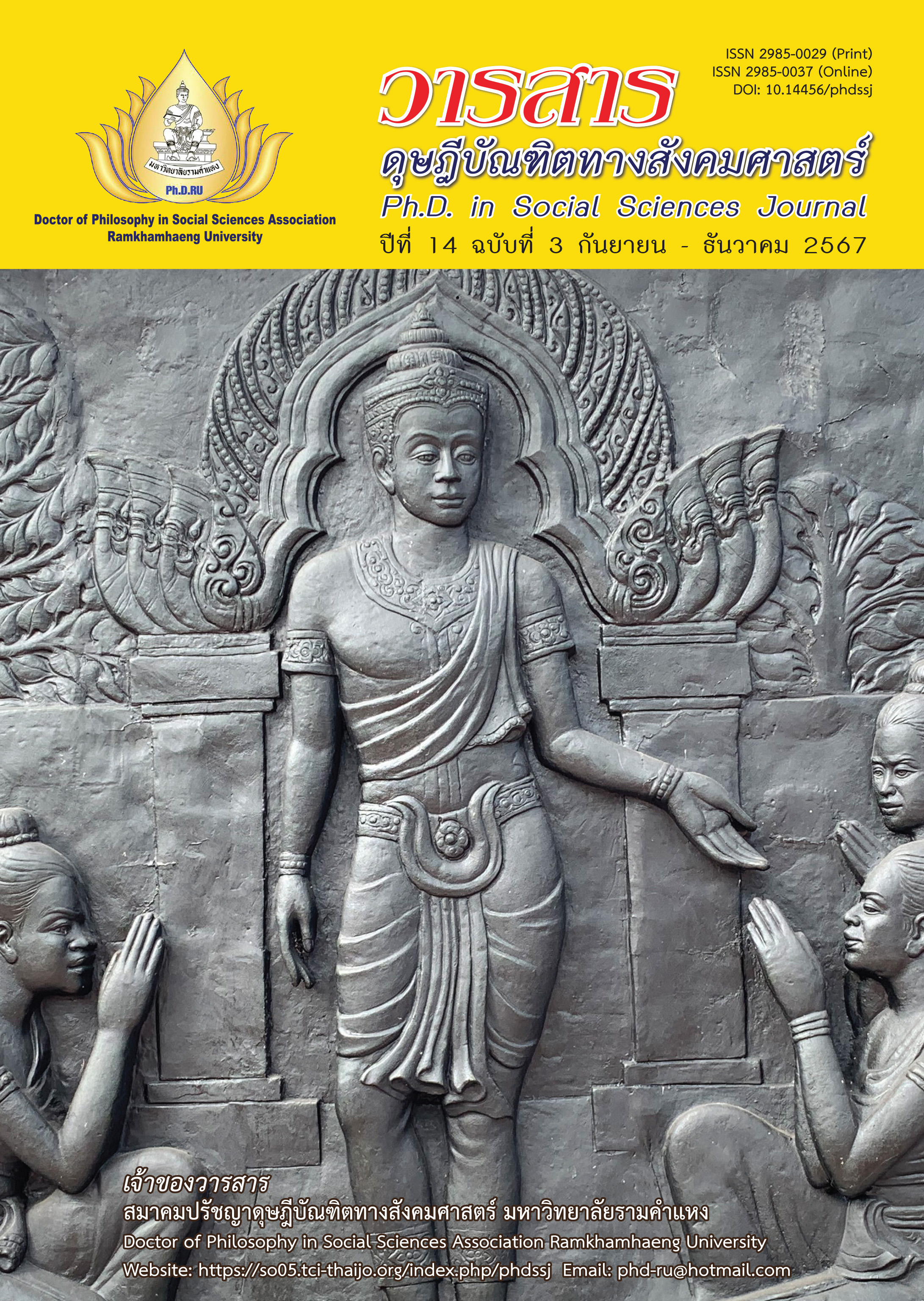Strategic Management Guidelines for Gas Stations to Accommodate Electric Vehicles
Main Article Content
Abstract
This academic article aims to explain the overall adaptation of gas station infrastructure to the era of electric vehicles. It begins by addressing the significance of the transition policy towards electric vehicles, analyzing the global and Thai perspectives on the transition from traditional gas stations to electric vehicle charging stations. The study examines and synthesizes strategic management concepts that can be applied to adapt gas stations to the electric vehicle era.
Findings are as follows: The strategic management concepts applicable to the adaptation of gas stations to the era of electric vehicles include (1) Strategy 5 Forces Management Concept (2) Strengths Analysis Strategy Management Concept (3) Blue Ocean Strategy Management Concept (4) Linkage Analysis Strategy Management Concept and (5) Innovation Strategy Management Concept. These concepts are integrated to design a strategic management approach for gas stations to accommodate electric vehicles by combining the aforementioned five strategic management concepts.
Article Details

This work is licensed under a Creative Commons Attribution-NonCommercial-NoDerivatives 4.0 International License.
Academic articles, research articles, and book reviews in the Ph.D. in Social Sciences Journal are author’s opinions, and not the publisher’s, and is not the responsibility of the Ph.D. in Social Sciences Journal Philosophy Association, Ramkhamhaeng University. (In the case that research is done on human, the researcher has to be trained in Ethics for Doing Research on Human Training and has to produce the evidence of the training).
References
Babkin, A. V., Lipatnikov, V. S., & Muraveva, S. V. (2015). Assessing the impact of innovation strategies and R&D costs on the performance of IT companies. Procedia–Social and Behavioral Sciences, 207, 749-758.
Chayachirakit, Y. (2022). Strategic management for young business executives to sustainable success. Journal of MCU Loei Review, 3(1), 151-159. [in Thai]
Christensen, C. M. (2015). The innovator’s dilemma: When new technologies cause great firms to fail. Harvard Business Review Press.
Christensen, C. M., Hall, T., Dillon, K., & Duncan, D. S. (2016). Competing against luck: The story of innovation and customer choice. Harper & Row.
Christensen, C. M., Raynor, M. E., & McDonald, R. (2015). What Is disruptive innovation?. Harvard Business Review, 93(12), 44-53.
Grant, R. M. (2019). Contemporary strategy analysis (10th ed.). John Wiley & Sons.
Hitt, M. A., Ireland, R. D., & Hoskisson, R. E. (2020). Strategic management: Concepts and cases, competitiveness and globalization. Cengage Learning.
International Energy Agency. (2021). Global EV outlook 2021. Retrieved from https://www.iea.org/reports/global-ev-outlook-2021
Johnson, G., Whittington, R., Scholes, K., Angwin, D., & Regnér, P. (2017). Exploring strategy: Text and cases (11th ed). Pearson Education.
Karnjanarat, K. (2021). Strategic management concepts applied to industrial management in Thailand. Journal of MCU Loei Review, 2(3), 201-213. [In Thai]
Kim, W. C., & Mauborgne, R. (2005). Blue ocean strategy: How to create uncontested market space and make the competition irrelevant. Harvard Business Review Press.
Kornkaew, W., & Pakasat, N. (2023). The innovation management approach of the modern automotive industry. Ph.D. in Social Sciences Journal, 13(1), 254-270. [In Thai]
Ministry of Energy, Energy Policy and Planning Office. (2021). Guidelines for promoting electric vehicles. Retrieved from https://www.eppo.go.th/index.php/en/component/k2/item/17415-ev-charging-221064-04 [In Thai]
Ministry of Energy, Energy Policy and Planning Office. (2022). Energy trend press conference. Retrieved from https://www.eppo.go.th/index.php/th/component/k2/item/18104-news-020665-01 [In Thai]
Ministry of Energy, Department of Energy Business. (2023). The list of gas entrepreneurs. Retrieved from https://www.doeb.go.th/info/info_operat_fuel.php [In Thai]
Porter, M. E. (2008). The five competitive forces that shape strategy. Harvard Business Review, 86(1), 78-93.
Ramraj, R., Pashajavid, E., Alahakoon, S., & Jayasinghe, S. (2023). Quality of service and associated communication infrastructure for electric vehicles. Energies, 16(20), 7170.
Sarawutratananont, C., Thabhiranrak, T., & Tevarattikal, U. (2023). A model of causal factor affecting the efficiency of gas station management in the Northern Part of Thailand. UMT Poly Journal, 20(1), 188-199. [In Thai]
Seubsui, N., Tiewwilai, N., Takhian, K., & Kongklai, S. (2023). Preventive behavior from particulate matter 2.5 (PM2.5) on the acute health effects of street food vendors in Thon Buri, Bangkok. Advanced Science Journal, 23(1), R120-R134. [In Thai]
Sirasoontorn, P., Rungsuriyawiboon, S., Opartpunyasarn, R., & Wongcharoen, P. (2022). Project of evaluate measures promoting electric vehicle adoption for consumer acceptance and energy efficiency in the transportation sector. Thailand Science Research and Innovation. [In Thai]
Sofwan, F., & Sukaris, S. (2023). Marketing challenges in the era of the transition of fuel oil vehicles to electric vehicles. Innovation Research Journal, 4(2), 101-107.
Sopapong, K., Sukhaparamate, S., Holumyong, T., & Sirawaritsara, A. (2023). Proactive development for management of electric vehicle charging station. Ph.D. in Social Sciences Journal, 13(2), 283-296. [In Thai]
Thanakornjirachod, P., & Panthong, S. (2023). Service marketing mix that influences the decision to use a oil station in Khao Khitchakut district, Chantaburi province. Journal of Social Science and Cultural, 7(1), 202-217. [In Thai]
The Government Public Relations Department. (2022). Resolution of the national electric vehicle policy committee No. 3/2021 and No. 1/2022. Retrieved from https://plan.prd.go.th/th/file/get/file/20220225b66399aedcb2ed4ae2b1b497488c467d165211.pdf [In Thai]


